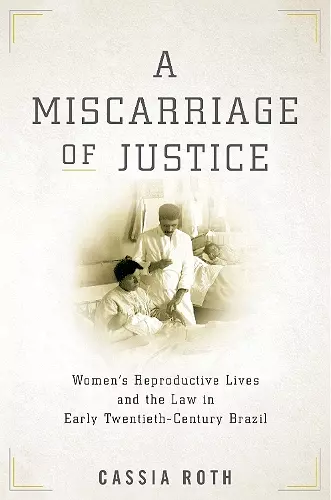A Miscarriage of Justice
Women’s Reproductive Lives and the Law in Early Twentieth-Century Brazil
Format:Paperback
Publisher:Stanford University Press
Published:14th Jan '20
Should be back in stock very soon

A Miscarriage of Justice examines women's reproductive health in relation to legal and medical policy in Rio de Janeiro, Brazil. After the abolition of slavery in 1888 and the onset of republicanism in 1889, women's reproductive capabilities—their ability to conceive and raise future citizens and laborers—became critical to the expansion of the new Brazilian state. Analyzing court cases, law, medical writings, and health data, Cassia Roth argues that the state's approach to women's health in the early twentieth century focused on criminalizing fertility control without improving services or outcomes for women. Ultimately, the increasingly interventionist state fostered a culture of condemnation around poor women's reproduction that extended beyond elite discourses into the popular imagination.
By tracing how legal thought and medical knowledge became cemented into law and clinical practice, how obstetricians, public health officials, and legal practitioners approached fertility control, and how women experienced and negotiated their reproductive lives, A Miscarriage of Justice provides a new way of interpreting the intertwined histories of gender, race, reproduction, and the state—and shows how these questions continue to reverberate in debates over reproductive rights and women's health in Brazil today.
"Roth's remarkably wide-ranging research offers a comprehensive and nuanced analysis of the science, law, politics, and lived experiences surrounding women's reproduction in Rio de Janeiro in the first half of the twentieth century. Deeply contextualized in the social, economic, and cultural history of post-abolition Brazil, A Miscarriage of Justice interrogates the dialogue between local and global histories of medical and legal sciences while maintaining focus on individual women whose reproductive lives were increasingly pathologized and criminalized. This remarkable book is sure to become required reading in the fields of Latin American and gender history."—Sueann Caulfield, University of Michigan
"With straightforward elegance, Roth conveys the harsh realities of women's reproductive experiences in Brazil in a time of great social transformation. Fully accounting for the historical, political, and cultural complexities of their interactions with the larger community and the state, the author documents both change over time and the continuity of women's legal—and even existential—disenfranchisement through varying political regimes."—Julia E. Rodriguez, University of New Hampshire
"In A Miscarriage of Justice, Cassia Roth provides an innovative and unique history of reproduction in Brazil, weaving together medical and legal directives on childbirth, abortion, and infanticide alongside the intimate, embodied experiences of gendered 'crimes' and social inequalities in Rio de Janeiro. Taking a broad view of reproductive health that explores motherhood, infanticide, and abortion simultaneously, Roth argues that the surveillance and criminalization of women's reproductive practices and of their racialized bodies were critical anchors of Brazilian state-building, especially during the complex years of the authoritarian Estado Novo. This is a deeply researched, sophisticated, and insightful study with significant implications for understanding reproductive justice issues even in contemporary politics."—Okezi T. Otovo, Florida International University
"Told with care and from a place of deep empathy, the heartbreaking stories in Miscarriage of Justice bring Brazilian women back into their own history, which has been told about them, but rarely through and with them. While a patriarchal legal system and medical institution tightened its control around women's reproductive lives, Roth shows through these women's stories that they wrested that control back in whatever way they could."—Leila A. McNeill, Lady Science
"Cassia Roth's lively and well-researched book,A Miscarriage of Justice, is a welcome addition to [writing reproduction into the history of human society]. This exploration of the politics of reproduction in twentieth-century Rio de Janeiro operates on two levels. First, the author attends to the political, medical, and legal discourses and practices that constructed and, with varying degrees of success, sought to regulate women's reproductive lives. Second, she pays careful attention to the meanings and experiences of reproduction for pregnant and parturient women themselves, as well as for their families and communities."—Nara Milanich, H-LatAm
"A Miscarriage of Justice is an impeccably researched feminist history of reproduction that centers the lives and deaths of women in the Brazilian capital of Rio de Janeiro during the early 20th century...Highly recommended."—B. A. Lucero, CHOICE
"A Miscarriage of Justice's main contribution lies in contextualizing the stories of women who appeared in investigations and judicial courts as suspects of abortions and infanticides and bringing their lived experiences to the forefront of the scholarship on gender, law, patriarchy, and motherhood in the twentieth-century Latin America."—Ana Paula Nadalini Mendes, Journal of Global Slavery
"Perhaps most powerfully, A Miscarriage of Justice deepens our historical understanding of the repressive laws and excessive medical interventions with which Brazilian women must contend in their experiences of fertility control, pregnancy, childbirth, and motherhood today."—Adam Warren, Bulletin of the History of Medicine
"This is an outstanding historical study. Cassia Roth consistently demonstrates sensitivity to complexity and nuance without losing the thread of her argument. ... A Miscarriage of Justiceis an absorbing read."—Ann Varley, Bulletin of Latin American Research
"This exhaustively researched and well-written book links criminal investigations for fertility control to the advent of republicanism in Brazil after the abolition of slavery in 1888, a gradual process that began with a 'Free Womb Law' manumitting the unborn babies of enslaved women.... Using a reproductive justice frame, Roth argues that while the Brazilian state promoted motherhood during the republican period, it did not take steps to provide all mothers equal access to the ability to raise a child free of poverty."—Rachel Nolan, Latin American Research Review
ISBN: 9781503611320
Dimensions: unknown
Weight: unknown
376 pages